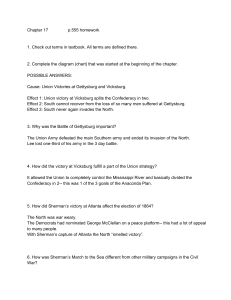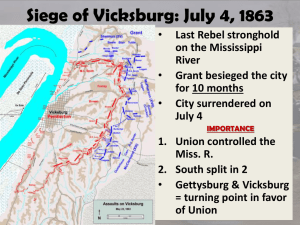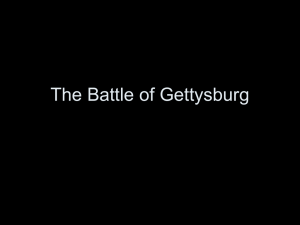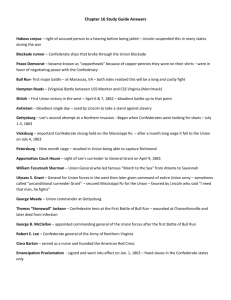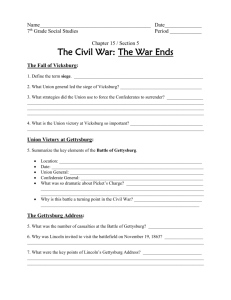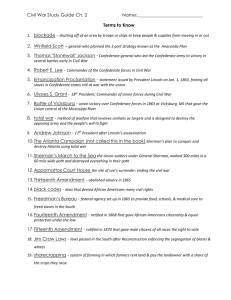The Civil War
advertisement
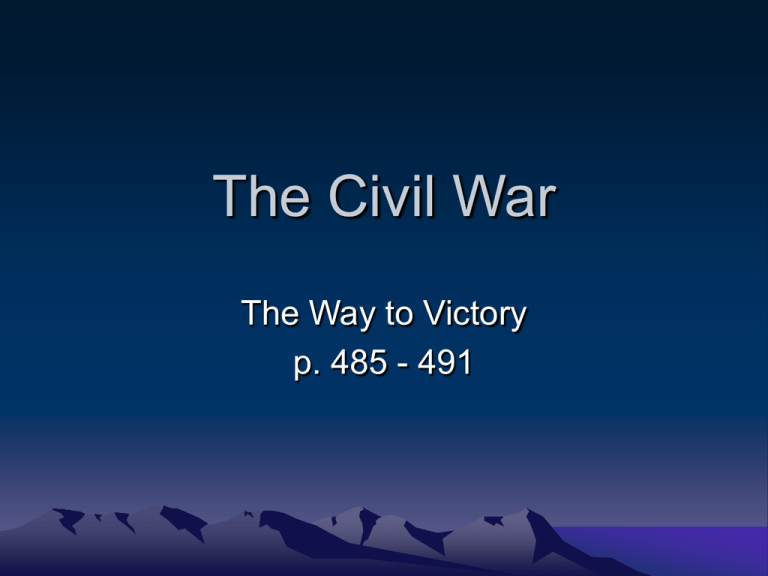
The Civil War The Way to Victory p. 485 - 491 Southern Victories • Robert E. Lee’s Army of Northern Virginia seemed unbeatable. • Lee’s grasp of strategy made him more than a match for weak Union generals. • Union General Ambrose Burnside was unable to defeat Lee at the Battle of Fredericksburg. • Burnside resigned and was replaced by Joseph Hooker. • Lee also won the Battle of Chancellorsville, but lost Stonewall Jackson. The Battle of Gettysburg • General Hooker was replaced by General George Meade. • Meade’s mission was to find and fight Lee’s forces and to protect Washington and Baltimore from Confederate attack. • The two army’s met by accident on July 1, 1863, near Gettysburg, Pennsylvania. • The 3-day Battle of Gettysburg began when Union cavalry surprised Rebel infantry raiding the town for shoes. The Battle of Gettysburg • Outnumbered, the Northerners fought desperately to hold the town before retreating to Cemetery Ridge, a line of hills south of Gettysburg. • The second day the Rebels launched another assault, but a counterattack saved the Union position. • On the third day of battle, Lee decided to launch an attack, determined to “create a panic and virtually destroy the Union army.” The Battle of Gettysburg • This last attack led by General George Pickett, is remembered as Pickett’s charge. • About 14,000 Confederate soldiers advanced across about one-half mile open ground toward the Union lines. • They made easy targets for Union fire as they marched. • Barely half of the Rebels returned from the charge. • Lee knew the battle was lost. Victory at Vicksburg • Meanwhile, a great battle was taking place at Vicksburg, Mississippi. • To gain control of the Mississippi River the Union needed to seize Vicksburg. • For several months, Union forces under Ulysses S. Grant had laid siege to the town. • Finally on July 4, 1863, Vicksburg surrendered. • The Union now held the entire Mississippi River. • Texas, Louisiana, and Arkansas were sealed off from the Confederacy. Victory at Vicksburg • The Union victories at Gettysburg and Vicksburg marked a turning point in the war. • They drove Lee’s army out of Pennsylvania, secured the Mississippi as a Union highway, and cut the South in two. • The war would still continue for two more years. Lincoln at Gettysburg • On November 19, 1863, at a ceremony dedicating a cemetery at Gettysburg, scholar Edward Everett spoke for two hours. • Then President Lincoln gave a two-minute speech called the Gettysburg Address. • The speech helped war-weary Americans look beyond the images of the battlefield and focus on their shared ideals. Final Phases of the War • After General William Tecumseh Sherman won an important victory at Chattanooga, Tennessee, Lincoln named Grant commander of all the Union armies. • Grant devised a plan to attack the Confederacy on all fronts. – The Army of the Potomac would try to crush Lee’s army in Virginia. – The western army, under Sherman, would advance to Atlanta, Georgia, and crush the Confederate forces in the Deep South. Final Phases of the War • Grant’s army smashed into Lee’s troops in a series of three battles near Richmond, Virginia: – The Battles of the Wilderness, – Spotsylvania Courthouse – Cold Harbor • After Cold Harbor, Grant swung south of Richmond to attack Petersburg, an important railroad center. • If it fell, Richmond would be cut off from the rest of the Confederacy. • Grant’s assault turned into a 9 month siege. The Election of 1864 • In the summer of 1864, Lincolns changes for reelection did not look good. • In August, David Farragut led a Union fleet into Mobil Bay and now controlled the Gulf of Mexico. • In September, Sherman captured Atlanta, GA. • In October, General Sheridan’s Union forces completed a campaign that drove the Rebels out of the Shenandoah Valley in Virginia. • With these victories Lincoln easily won reelection. Total War • Leaving Atlanta in ruins, Sherman’s army began the historic “march to the sea” to Savannah, Georgia. • As the army advanced, it abandoned it supply lines and lived off the land it passed through. • Union troops took what food they needed, tore up railroad lines and fields, and killed animals n an effort to destroy anything useful to the South. • This method of waging war was known as total war. Total War • After capturing Savannah, Sherman turned north and marched through South Carolina, devastating the state. • Sherman planned to join Grant’s forces in Virginia. Victory for the North • In his 2nd Inaugural Address, Lincoln spoke of the coming peace. • Grant continued his siege on Petersburg, Virginia. • Finally the Confederate lines broke and Lee withdrew his troops. • Richmond fell the same day. • As government officials fled, they set fire to much of the city to keep it from falling into Union hands. Surrender at Appomattox • Lee moved his army west of Richmond, hoping to link up with the small Confederate force that was trying to stop Sherman’s advance. • The Union army blocked his escape route. • Realizing the situation was hopeless, Lee said: “There is nothing left for me to do but go ad see General Grant, and I would rather die a thousand deaths.” • On April 9,1865, Lee and his troops surrendered to Grant at Appomattox Court House. Surrender at Appomattox • Grant’s terms were generous: The Confederate’s had to lay down their weapons, but then were free to go home. • Grant allowed them to keep their horses so that they could “put a crop to carry themselves and their families through the next winter.” • Grant also ordered three days’ worth of food sent to Lee’s troops. • Jefferson Davis was captured on May 10th and the Civil War was over. Results of the War • More than 600,000 soldiers died, and the war caused billions of dollars of damage, most of it in the South. • The North’s victory saved the Union. • The Federal government was strengthened and was now clearly more powerful than the states. • The war freed millions of African Americans.
